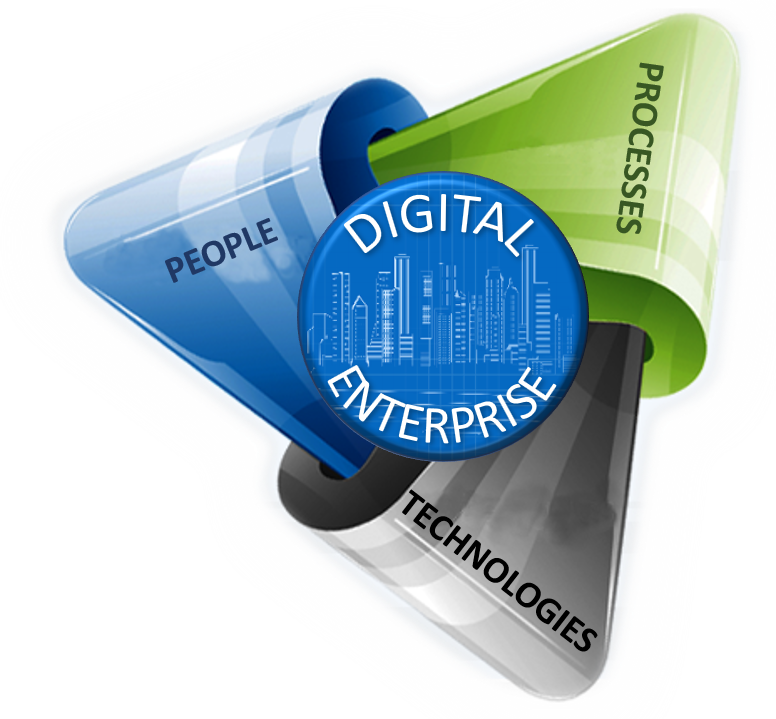“Today,” business consultant Rishad Tobaccowala (@rishad), insists, “every company is a tech company.”[1] In Part 1 of this article, I explained why he makes that assertion and discussed why organizations should transform into digital enterprises. In the concluding part of the article, I will discuss some of the fundamental principles experts suggest will help any business transform successfully into a digital enterprise. As I noted in the earlier article, professionals in the building trade understand that a great building begins with a good vision and a strong foundation. Vision is important because no two digital transformation journeys will be the same. Each organization must envision for itself the path it will take and gather the resources it will need to achieve that vision. Organizations must also understand that transformation is an ongoing process — a never-ending journey into the future. Some fundamental principles, regardless of the economic sector in which an enterprise functions, are universal. For example, no business will be successful if it fails to optimize people, processes, and technologies.
Building on Fundamental Principles
Tobaccowala writes, “While there is great complexity, [which] we must all grapple with as we seek a profitable and successful tomorrow, there are only two key drivers that matter. These are the ones we should focus on, without getting distracted by the cacophony of distracting headlines or consultants offering complex choices. Get these two more or less right, and you and your firm should thrive.” Tobaccowala’s two key drivers are: Technology and talent. Although I agree they are important, he missed the third important driver: Processes. Below I will discuss why experts suggest companies should optimize each of these business fundamentals.
People
Tobaccowala writes, “Given the right resources, the firm with a disproportionate share of talent passionately aligned with a common outcome is likely to win. It is true in sports, and it is true in business.” For years business consultants have argued that a company’s most valuable asset is its people. Although some pundits now argue that data is a company’s most valuable asset, people still generate great value when they have the right skills and are given the right resources. Nagendra Bandaru (@nagbandaru), President and Managing Partner at iCORE Business Line, argues companies should also think about working conditions, including from where employees operate. He notes, “Virtual and remote working are here to stay.”[2] Although remote doesn’t work for every business, Bandaru reports, “There is a positive side to the remote working model, such as the prospect of improving talent diversity and inclusivity, as recruitment is no longer limited by the location and proximity of talent. The model enables access to the unlimited and vast potential that the global talent pool now presents.”
Processes
Bandaru argues there is an increasing “demand for a dynamic digital business operations.” He explains, “Enterprises that concurrently invest in a scalable infrastructure — coupled with business process transformation through automation, data sciences, analytics and AI capabilities — are the ones that should emerge as true winners. They should be able to withstand sudden and unpredictable disruptions.” A word of caution. Tech writer Roberto Torres (@TorresLuzardo) writes, “Organizations are plugging real-world processes into the digital realm. Though software frequently delivers more efficiency, a net-positive outcome isn’t guaranteed.”[3] Why? Bill Gates (@BillGates) explains, “The first rule of any technology used in a business is that automation applied to an efficient operation will magnify the efficiency. The second is that automation applied to an inefficient operation will magnify the inefficiency.” My advice is to do your homework, know which processes can and should be automated, and discover and correct the pain points or inefficiencies before proceeding.
In the Digital Age, the lifeblood of business processes is data. Randy Bean (@RandyBeanNVP), Founder and CEO of NewVantage Partners, and Ash Gupta, former American Express executive and Chairman of the Board for Corridor Platforms, explain, “One of the greatest assets that any business maintains is its unique set of customer data — customer interactions, transactions, and behavioral history. Whether this is information about your customer’s behavior, habits, or transactions, or other information, it is essential to understand what unique insights your particular data gives you. Knowing that, and how to combine it with external data sources, allows you to build and maintain a uniquely competitive business asset for your organization.”[4] In other words, good data drives good processes.
Digital processes are increasingly driven by cognitive technologies (i.e., some form of artificial intelligence), and often involve other emerging technologies as well. Bandaru explains, “Technologies like IoT, 5G, edge and AIOps are moving toward a world of changing ecosystems and convergence. Enterprises will need to build the ability to use real-time analytics for fast and confident decision-making. At the intersection of these technologies is the holy grail of business: a better understanding of customers, stakeholders and market needs.” At the heart of a great business, lies great decision-making. Bain analysts, Michael C. Mankins and Lori Sherer (@lorisherer), report, “Companies that make better decisions, make them faster and execute them more effectively than rivals nearly always turn in better financial performance. Not surprisingly, companies that employ advanced analytics to improve decision making and execution have the results to show for it.”[5]
Technology
As Bandaru noted, cutting-edge technologies like AI, 5G telecommunications, and the Internet of Things are essential (or will be) for successful digital enterprises. Tobaccowala adds, “[Companies must] understand how technology is a) changing people and their behavior and b) reconfiguring [their] products, services and experiences by enabling new competitors, redefining value, eroding or creating competitive advantage and radically transforming economics. … Smart companies and leaders understand the critical nature of technology and realize that the understanding of its potential should be throbbing in the beating heart of every key employee.” Bean and Gupta warn, however, that the technology tail shouldn’t wag the business dog. They explain:
“Organizations too often equate success with making leading edge technology investments, while often straying from the core business strengths which has made a firm competitive and unique. To be successful, executives need to synthesize business characteristics with technology capabilities so that organizations do not get lost in the complexity of their solutions. Wise organizations start with the high-value business opportunity they are seeking to address and ask how technology can be deployed to achieve the desired outcome — they don’t start with tech and work backwards.”
One of the most oft-heard comments in business discussions is that an enterprise should be data driven. That sounds very reactive. As one businessman stated, “Data is a key ingredient of our future success. I hate the term data driven. I just don’t like it; it sends the wrong message. We try to use the term to be data empowered.”[6] The right data and the right technology will make your company data empowered.
Concluding Thoughts
Paul Leinwand (@PaulLeinwand), global managing director for capabilities-driven strategy and growth at Strategy&, and Mahadeva Matt Mani (@MMahadev), lead for the transformation platform for PwC and Strategy&, conclude, “Without a more fundamental business transformation, digitization on its own is a road to nowhere. Remember Peter Drucker’s famous quote: ‘Management is doing things right; leadership is doing the right things.’ Now is the time for executive teams to step up, disrupt themselves, and become leaders in the digital age.”[7]
Footnotes
[1] Rishad Tobaccowala, “The ‘Third Connected Age’ of Tech Is Here—Is Your Company Prepared?” Adweek, 28 June 2021.
[2] Nagendra Bandaru, “Four Pillars Of Business Transformation To Bring The Future Closer,” Forbes, 28 June 2021.
[3] Roberto Torres, “To succeed at RPA adoption, don’t automate inefficient processes,” CIO Dive, 5 February 2020.
[4] Randy Bean and Ash Gupta, “Legacy Companies Need to Become More Data Driven — Fast,” Harvard Business Review, 15 June 2021.
[5] Michael C. Mankins and Lori Sherer, “Creating value through advanced analytics,” Bain Brief, 11 February 2015.
[6] Alarice Rajagopal, “The Future of Business Means Ditching ‘Data Driven’ and Being Data Empowered,” Consumer Goods Technology, 24 May 2021.
[7] Paul Leinwand and Mahadeva Matt Mani, “Digitizing Isn’t the Same as Digital Transformation,” Harvard Business Review, 26 March 2021.





